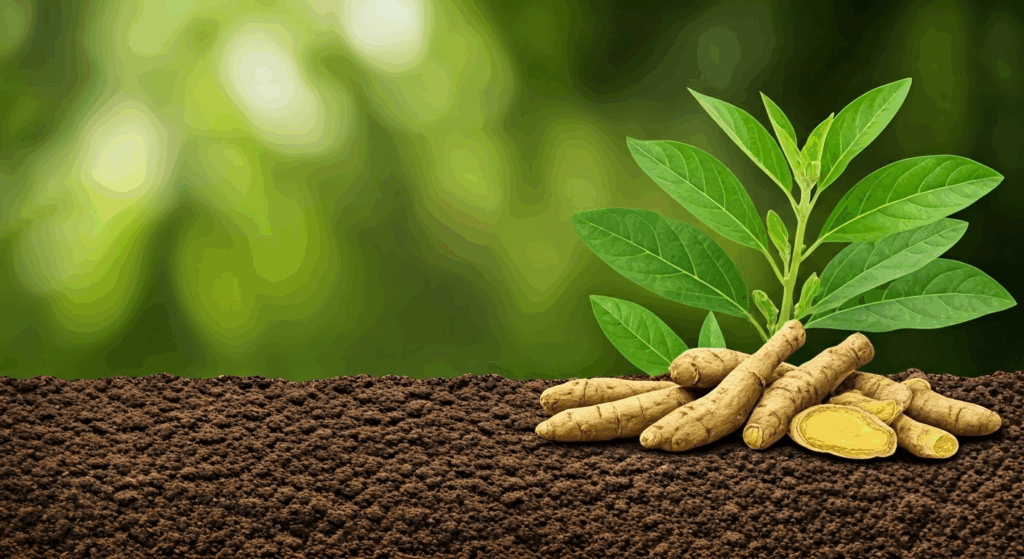The Surprising Benefits of Ashwagandha for Stress Relief

Key Highlights
- Ashwagandha, scientifically known as Withania somnifera, is a revered herbal medicine with roots in ayurvedic practices, often referred to as Indian ginseng or winter cherry.
- This adaptogenic herb has a proven ability to regulate cortisol levels, fostering stress relief and managing anxiety symptoms effectively.
- Clinical studies highlight its role in improving sleep quality, cognitive function, and physical performance, making it a sought-after supplement.
- Ashwagandha also supports hormonal balance, particularly testosterone levels, and may boost immunity and overall health.
- While considered safe for short-term use, ashwagandha may pose risks for certain individuals, emphasizing the importance of consulting a healthcare provider before use.
Introduction
Stress can wear down your mind and body. It makes you want some real help. That is where ashwagandha steps in. Ashwagandha is a herbal supplement that comes from ayurvedic medicine. It is well known for helping with stress. This herbal supplement is made from the withania somnifera plant and gives you a natural way to deal with the stress from life.
Ashwagandha does even more than lower stress. It also helps you sleep, improves how sharp your mind is, and makes your body tougher. Would you like to know how this old remedy can fit into your life today? Take a look at the long story, many uses, and wide range of good things that ashwagandha has to offer.
Understanding Ashwagandha and Its Roots in Ayurveda

Its name in Sanskrit means “smell of the horse.” This name points to how it can help people become stronger. Ashwagandha is an important part of herbal medicine and stays popular in natural health around the world. Now, let’s look at what makes this small shrub so special.
What is Ashwagandha?
Ashwagandha powder, also called Withania somnifera, is key in herbal medicine. People often know it as Indian ginseng or winter cherry. It is a small shrub that has flowers. Many value ashwagandha powder for its ability to help the body handle stress in a natural way.
All the parts of this plant have some power. But, the root stands out the most. The root extract has special things in it, like withanolides. These give the herb the strength to boost health. It does more than fight off stress. It may help you have more energy and help keep your hormones in balance too.
People have looked to ashwagandha for many years. They have used it to help with stress, feeling tired, and not sleeping well. Now, you find it as a dietary supplement for good reason. It helps answer today’s needs just as it did long ago. Its use in giving support for both your body and mind keeps it strong in the world of wellness.
Keywords: indian ginseng, withania somnifera, winter cherry, herbal medicine, dietary supplement
Historical Significance in Traditional Medicine
Ashwagandha has been used for a long time as a healing herb in ayurvedic medicine. People know it for its old, trusted uses. People used it for stress, feeling tired, and memory loss for many years.
In ayurvedic medicine, ashwagandha is praised for the way it helps renew the body. It is called a rasayana. In the past, people used strong root extracts from this plant to balance the body’s doshas and boost their energy. The story of this herb shows its big role in taking care of health in a whole way.
Ashwagandha was not just used in India. It also became a part of Unani medicine and other ways of healing from the past. People turned to this herb for swelling, joint pain, or problems with fertility. This long history makes ashwagandha special. It is not just a common herb, but a sign of strong, old healing ways.
How Ashwagandha Combats Stress and Anxiety

Research shows that ashwagandha helps the body control stress by balancing hormones, especially cortisol. This is what makes it different when it comes to helping with both emotional and physical signs of stress. Now, let’s look at how science explains its stress-relieving effects and how it helps bring your mind and body into harmony.
Mechanisms of Stress Reduction
Ashwagandha helps to lower stress by affecting your cortisol levels. Cortisol is a hormone that is part of your body’s stress response. When ashwagandha controls how much cortisol the body produces, it can help ease many physical signs of stress.
Ashwagandha also lowers other key stress chemicals in the body, such as heat shock proteins and JNK-1. By changing how these stress-response chemicals work, it helps the body become better at handling pressure. Some studies say that ashwagandha’s special traits keep the stress system—called the HPA axis—from becoming too active, which helps lower anxiety levels.
Ashwagandha does more than just help with hormone balance. It helps manage anxiety levels by making the brain’s responses more stable and helping you feel calm. If you want a natural or herbal way to deal with stress and anxiety, ashwagandha can be a good and simple choice thanks to the way it works on the body.
Ashwagandha’s Impact on Cortisol Levels
Cortisol is sometimes called the “stress hormone.” When there are high cortisol levels in the body for a long time, it can cause problems. Ashwagandha can help bring your hormones back to balance by lowering extra cortisol.
There are studies that show this works. In one randomized controlled trial, people who took ashwagandha supplements had much lower serum cortisol levels than those in the placebo group. With these lower serum cortisol levels, they had a clearer mind, fewer stress symptoms, and better sleep.
Keeping cortisol steady like this helps with stress relief and physical health by getting to the cause of hormone problems. Because it helps the body cope better, ashwagandha can make a big difference to quality of life.
Case Studies and Clinical Evidence
There is strong proof that ashwagandha root can help with stress and anxiety disorder. In one randomized controlled trial, people who took 600 mg of ashwagandha root extract felt less stressed and had lower cortisol levels.
A systematic review of other studies found the same thing. People saw better sleep quality and less anxiety. One more clinical trial involving healthy volunteers showed that ashwagandha made a big difference for those with anxiety and mild depression caused by stress.
All these results show the wide range of benefits from this plant. More research will help make sure the findings are clear, but right now, these studies show ashwagandha root might be a good and natural way to manage stress. The current clinical proof is strong.
Additional Health Benefits of Ashwagandha
Studies show ashwagandha may help with athletic performance and keep hormones in balance too. It supports restful sleep and helps the body fight illness. Because of these things, ashwagandha has many uses. Now, let’s talk about these health benefits in detail, starting with how it can make your sleep quality better.
Enhancing Sleep Quality
If you have trouble finding restful sleep, you may want to try ashwagandha root. There are studies that show it can help improve sleep quality. The research says it also helps people fall asleep faster.
One clinical study was done with older adults experiencing a lack of restful sleep, assessing the tolerability of ashwagandha root extract. They took 600 mg of ashwagandha root extract each day. The results showed their sleep got better and they slept more efficiently. The people in the study said they woke up feeling more refreshed and alert.
Ashwagandha root is helpful if you deal with insomnia. This herb lowers anxiety levels and helps you relax. Because of this, it helps make a better setting for restful sleep at night. These points make ashwagandha root a good choice when you want better sleep quality, especially for older adults.
Boosting Immune System Function
A strong immune system is key to good overall health. Ashwagandha can help make it better. This herb works by helping the body’s immune system respond well to problems.
Ashwagandha helps increase antioxidant activity in the body. This lowers stress and helps the body fight off sickness. It is also very useful if you do resistance training and need to recover after working out.
Ashwagandha helps control stress. By lowering stress, it also helps the immune system work better. When you have less of the stress hormone called cortisol, your immune system can do a good job. This is why ashwagandha is useful not just as a supplement, but as a way to take care of the body in the long run. These benefits come in for anyone who wants to keep their immune system and overall health in good shape all year.
Supporting Cognitive Functions
Ashwagandha, the herbal supplement ashwagandha, is getting more attention for how it helps brain health. It can help boost cognitive function by helping with memory and focus. This is true for older adults, but others may get these benefits too.
Some studies show that ashwagandha supplementation helps people react faster and do better on brain tasks. The antioxidants in ashwagandha work to keep brain cells safe from damage, and this may help keep the brain working well for a long time.
There are other trials that point to ashwagandha being helpful for people who do not think as clearly as they used to, either from aging or even in problems like schizophrenia. This lets us see ashwagandha as a good way to help keep your mind sharp at any time in your life.
Benefits for Physical Performance and Recovery
Athletes and people who love fitness can get many benefits from ashwagandha’s power to help performance. Clinical trials show that it helps to grow muscle strength, boost aerobic ability, and speed up recovery time after exercise.
For instance, when people do resistance training and take ashwagandha, they see better muscle growth and higher VO2 max. This herbal medicine can also cut down on tiredness during physical activity. Because of this, it is very good for those who want steady athletic performance.
Ashwagandha also helps people recover after workouts, as it lowers inflammation and muscle soreness. So, if you want to be strong and recover better, this herbal medicine gives a full advantage.
Optimal Dosage and Method of Consumption
Finding the right amount and way to take ashwagandha can help you get the most health benefits from this herbal supplement. Most studies say that taking ashwagandha is effective at about 300 to 500 mg per day, which is generally considered good to help with stress and bring more energy. Taking it as a single dose or as a powder mixed with warm milk or water can help your body take it in better. If you are new to ashwagandha root, start with lower doses so you can see how your body reacts. You can slowly take more if you need it, but it’s best to do this with help from your healthcare provider so you get the best results. If you are wondering how much ashwagandha you should take, consult a medical expert for guidance.
Recommended Daily Intake
For most healthy adults, it is best to take about 300 to 500 mg of ashwagandha root extract each day. This amount often gives stress relief and helps lower the chance of side effects, according to a review of studies. You can start with lower doses to see how your body reacts, then go up if needed. If you are thinking about trying this herbal supplement, talk with a healthcare provider first. This is extra important if you take other medicine or have any health problems. Your healthcare provider can help you know what is safe and if this is good for you.
Various Forms of Ashwagandha and Their Uses
There are many types of ashwagandha, and each one can help with different things. Ashwagandha root powder is often found in herbal supplements. Many people use it for better overall health and more energy. Capsules with measured extracts are good if you want to take the same amount every time. Ashwagandha tinctures work fast and might help your brain and cognitive function. Some athletes also use ashwagandha before a workout. They do this to try to boost muscle strength and improve athletic performance. When you know about these options, you can pick the best ashwagandha form for your needs.
Precautions and Potential Side Effects
While ashwagandha is a herbal supplement that is often safe for most people, there are some potential health benefits to keep in mind. Some side effects, including more serious side effects like stomach upset, tiredness, and headaches, can happen. These problems could affect your overall health.
If you take diabetes medications or thyroid hormone medications, you should talk to your healthcare provider before starting ashwagandha supplementation. Doing this helps avoid any bad reactions between your medicine and the herbal supplement. Pregnant or breastfeeding women should also be careful about using ashwagandha.
People who use this supplement might want to keep an eye on their cortisol levels and thyroid function. This can help you get the most from ashwagandha while lowering the risk of problems.
Common Side Effects to Consider
While ashwagandha is usually safe for most healthy adults, some people may get side effects. Stomach upset, diarrhea, and nausea can be common, especially when you first start this herbal supplement. If you take a higher dose, you might feel sleepy or have headaches. It is important to look out for how your body feels and reacts. You should talk with a healthcare provider before starting, especially if you take diabetes medications or thyroid hormone medications, or if you already have any health problems. People’s experiences with this herbal supplement can be different.
Who Should Avoid Ashwagandha?
Some people should not take ashwagandha. This includes women who are pregnant or breastfeeding. It also includes people with autoimmune diseases and anyone who takes sedatives or thyroid medicine. If you have any health problems, it is important to talk to a healthcare professional for advice that is right for you.
Conclusion
Adding ashwagandha to your day can bring many health benefits. This herbal supplement comes from the ashwagandha root. Many people say it helps with stress and can boost your energy and overall health. Studies show it may support the immune system, help you sleep better, and be good for athletic performance.
It is important to think about the right dosage and your own health before you use it. Always talk to a healthcare provider before you start any herbal supplement. This will help you get the most health benefits and keep you safe from any adverse effects that can come with taking too much. With care and by staying aware of these things, you can feel good and avoid most problems.
Frequently Asked Questions
How long does it take for Ashwagandha to work?
Ashwagandha usually starts to help with stress and anxiety after about 2 to 4 weeks. The way it works for each person can be different. This depends on things like how much you take, the type you use, and your health. To get the best results, you should use it often.
Can Ashwagandha be taken with other medications?
Ashwagandha can mix with some medicines. This is true for drugs used for anxiety, thyroid issues, or high blood pressure, especially those that affect thyroid hormone levels. You need to talk to a healthcare professional before you use ashwagandha with other things. This way, you can be sure it will be safe and work well for you. People have different health needs, so it is important to ask before you start.
https://pubmed.ncbi.nlm.nih.gov/32201301
https://pubmed.ncbi.nlm.nih.gov/31046033
https://www.ncbi.nlm.nih.gov/pmc/articles/PMC7710824
https://doi.org/10.3389/fnut.2024.1439294
https://www.mdpi.com/2411-5142/6/1/20/htm

